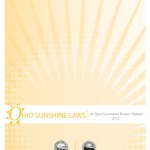“The rule in Ohio is that public records are the people’s records, and that the officials in whose custody they happen to be are merely trustees for the people; therefore anyone may inspect such records at any time, subject only to the limitation that such inspection does not endanger the safety of the record, or unreasonably interfere with the discharge of the duties of the officer having custody of the same. Patterson v. Ayers, 171 Ohio St. 369 (1960).” – Ohio Supreme Court Justice Charles Zimmerman
————
Here are a few high-level tips on utilizing Ohio’s Open Records Laws (commonly known as the “Sunshine Laws”) to secure copies of records held by Ohio governmental agencies.
Please be aware, no one associated with Courtroom Sunshine, Inc. is an attorney, so therefore, we are not allowed to offer legal advice.
Here we lend some pointers based on our own experiences in securing public records. Of utmost importance is to reference the official authority; the Ohio Attorney General’s Office. Their link is offered on our “Helpful Links” page.
First, download the latest version of the Ohio Sunshine Laws Manual here.
If time permits, you would benefit greatly by attending the course offered by the State Attorney General’s office for “Sunshine Laws Training”. It is free and open to the Public. You will be sitting in a large classroom with most of the attendees being Ohio government employees. Many of them are required to take this class. You can view Cito Sunshine’s certificate of completion here. This is what you should strive to achieve. This was not the first time through this course for Cito, but keeping fresh by repeating the course periodically is important to our efforts.
Short of this, the best advice we can lend is to secure at least one record of the type which you would like to request. This will give you a sample of the wording to use in your request. For example, if you are interested in receiving copies of a judge’s final divorce rulings for a specific month, then you will have the proper wording to reference. You may be able to start with your county court’s website, if they have one, to see if they make their records of the type which you are interested, available online. If not, you could try calling into the county Clerk of Courts for the court of interest, and ask for help on finding a specific record. If you get lucky and find you are speaking with a knowledgeable and helpful clerk, then let them know what types of records you would like.
Keep in mind, under the Open Records Act, THEY ARE NOT ALLOWED TO ASK WHAT YOU PLAN TO DO WITH THE RECORDS WHICH YOU ARE REQUESTING, nor are they allowed to ask for your identity.
Be prepared for the official to respond back that “your request is overly broad”. [Columbus Dispatch, March 18, 2014] This is one of the few allowable causes for rejection. However, they are required to lend assistance to you in refining your request to meet how they store their records.
“Chapter Two: Requesting Public Records
When a request lacks the details the office needs to identify where to look for responsive materials, or seeks what amounts to a complete duplication of the office’s files, the Public Records Act promotes cooperation to produce a successful, revised request.
a. Mandatory Clarification in Response to Ambiguous or Overly Broad Request
The Ohio Public Records Act allows a public office to deny any overly broad or ambiguous records request. However, the public office is required to give the requester the opportunity to revise the request by explaining how it ordinarily maintains and accesses the records it keeps.148
The office’s records retention schedules can be a helpful starting point, because they categorize records based on how they are used and the purpose they serve.”
Therefore, be prepared to have your request rejected, and then be persistent. As long as the records which you desire are truly public records, and as you will find by reading through the Manual, very few records kept by our governmental offices are not public records, you are entitled to receive copies. It is all in the proper identification of the desired records, limiting the number to a “reasonable” quantity, and in persevering.

